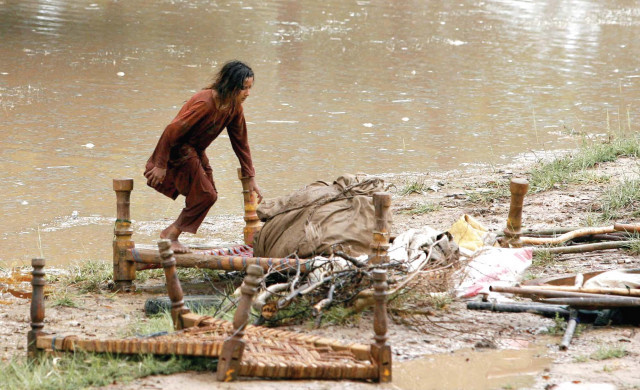Reeling from the disaster: A year on, flood devastation still an open wound
Oxfam report says Pakistan unprepared for this year’s monsoon floods.

Still reeling from the super floods of 2010, Pakistan is woefully unprepared for this year’s monsoon floods, international aid agency Oxfam has warned.
“Families have started moving to higher ground as they are scared of losing everything once again,” Neva Khan, head of Oxfam in Pakistan, said at a press conference on Tuesday that marked the first anniversary of the floods.
“Pakistan needs to act now. Investing in measures today that reduce the impact of disasters is essential to save lives and safeguard development gains in the future,” Khan said. “It will ensure schools built with aid funds are not washed away and that farmers can keep the crops they have toiled over. A year after Pakistan’s mega floods it’s time we learnt this lesson.”
Releasing a new report entitled “Ready or Not”, Oxfam said that 37,000 people were still in camps in Sindh, the worst-hit province, and 800,000 families nationwide were without proper homes.
It warned that river embankments had not been rebuilt, leaving villages more open to flooding, and that two to five million people were likely to be affected by this year’s floods.
“Villagers in areas that we work fear new flooding. Many are planting fewer crops than usual as they are worried that their harvests will be destroyed in fresh floods,” Khan said.
Criticising the government’s response, Oxfam called on the government of Pakistan to implement recommendations that the World Bank and the Asian Development Bank had made in November. The banks had recommended that Pakistan should invest $27 million backed up with yearly top-ups to improve disaster management and reduce losses in future emergencies. This is affordable, Oxfam says, as the country had spent more than this (some $32 million) on expenses incurred by National Assembly members.
Oxfam has also asked the government to deliver on its pledge to earmark at least two per cent of district budgets for disaster preparedness.
“We therefore appeal to people to make arrangements themselves before any tragedy hits,” Khan said. “Nothing is expected from the government this year and they are not going to do anything in the future.”
Pakistan’s chronic corruption has also made donors wary of giving more money, and the Oxfam report said a UN appeal had a shortfall of $600 million for “early recovery activities”.
Oxfam urged donors to invest in measures to reduce the impact of disasters as part of their overall aid packages for Pakistan and suggested that they allocate at least 10% of humanitarian and recovery assistance to projects that mitigate impact.
Helen McEthinney, Oxfam policy and advocacy adviser, said that there needs to be an updated disaster management plan. “Pakistan Disaster Risk management framework, which was constituted during the 2005 earthquake, needs to be streamlined,” said McEthinney.
She said that after devolution under the 18th amendment, acting partners were unclear about the roles and responsibilities of disaster management authorities. “It’s like everything is just being thrown in the air. Actors on ground are confused and there is no overall national picture that will clarify their queries,” she said.
Meanwhile, the International Committee of the Red Cross (ICRC), in a statement issued on Tuesday, also said that emergency relief distributions continue to the most vulnerable communities around Jacobabad, Sindh.
“While the 2010 floods claimed fewer lives than the disastrous Kashmir earthquake of 2005, many observers considered the devastation caused by the floods to be on a similar scale,” said André Paquet, acting head of the ICRC in Pakistan. (With additional input from AFP)
Published in The Express Tribune, July 27th, 2011.



















COMMENTS
Comments are moderated and generally will be posted if they are on-topic and not abusive.
For more information, please see our Comments FAQ